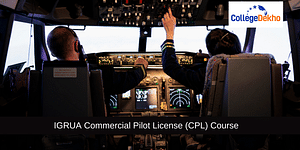Bartending Subjects & Syllabus 2024
The Bartending course syllabus is an exciting blend of theory and practice to churn out skilled professionals. Usually offered on a Certificate or Diploma level, Bartending courses duration ranges from 1 month to 6 months. The major subjects covered in this course are Bartending Basics, Mixology, Liquors and Liqueurs, Modern Bar Tools and Professional Equipment, and more.
Bartending Courses Syllabus & Subjects Overview
The Bartending course syllabus equips students with the skills, knowledge and behavioural attitude that are required to perform the duties, tasks and steps that are essential for the role of bartenders in various bar and food and beverage outlets. The syllabus provides operational knowledge to run a bar and provide wine services to guests in hotels and other hospitality industries. The Bartending subjects include the origin and history of bartending, the qualities of a bartender, setting up a bar, replenishing bar supplies, presenting a bar menu to guests, preparing drink orders and use of bar tools and equipment. After Bartending courses, students can work as mixologists, bar managers, barkeepers, wine and spirit brewers and wait staff.
Bartending courses are beneficial for those who wish to start their career in the bar and hospitality industry. The course provides essentials about bartending such as mixing cocktails, bar setups, tools, garnishing techniques and several classical and contemporary recipes. Students can pursue Bartending certificate courses and Diploma in Bartending. Often in hotel and hospitality management courses, a portion of the syllabus consists of the basics of bartending. The Bartending course structure is formed in such a way that it provides exposure to both theoretical and practical skills that help in maintaining a realistic bar setting. Apart from practical skills, friendly behaviour, organisation, multitasking and communication skills form equally important roles in making a skilful bartender. Check out the page to find out more about the Bartending course syllabus.
Table of Contents
- Bartending Courses Syllabus & Subjects Overview
- Bartending Courses Year Wise Syllabus
- Bartending Courses Subjects
- Specialisations Offered in Bartending Courses
- Syllabus for Bartending Courses Distance Programs
- Bartending Courses Entrance Exam Syllabus
- Bartending Courses Important Books
- Bartending Course Structure
- FAQs about Bartending Syllabus
Bartending Courses Year Wise Syllabus
The Bartending syllabus is prepared in a way to help students work as professionals in any type of bar, including luxury hotels and cruise lines. They equip them with knowledge of mixing various types of cocktails, preparing molecular cocktails, full knowledge of liquors and liqueurs, decorations and garnishes and serving drinks. The Bartending courses are mostly offered in certificate or diploma formats. Here is a guideline of the syllabus of Bartending courses and a Diploma of Bartending courses syllabus for easy reference.
Bartending Certificate Syllabus
The Bartending syllabus of certificate courses initiates students into the art of mixing and techniques of cocktail presentation. Also, they get to learn the essentials of bar management and others Here is a syllabus of Bartending certificate courses:
| Behind the Bar Knowledge | Hygiene and Sanitation |
|---|---|
| Standard Restaurant & Bar Procedures | Introduction and use of the tools of the trade |
| Standard industry bar terminology | How to garnish drinks and cocktails |
| Standard beer and wine instruction | Industry customer service standards |
| Food & beverage industry practices | Work with bar equipment and tools |
| Responsible bartending | Liquor and wine information |
Diploma in Bartending Syllabus
The Diploma in Bartending syllabus includes knowledge of personality development, beverage operations, bar operations, knowledge of indigenous spirits and liquors and industrial training. Here is a synopsis of the syllabus for a Diploma in Bartending:
| Improving Self Confidence | Improving Self-Presentation |
|---|---|
| Introduction to Spirits | Liqueurs: Brands and Service: Indian and International. |
| Bar Stock Maintenance | Bar Planning and Designing and Costing Corkage |
| Introduction, History, Types and Preparation of Cocktails | Introduction to Bar Operation |
| Designing of Bar | Stock Control – Purpose of Stock control, |
| The Bar and Bar Equipment- Bartender- Customers | Guidelines for Bartenders |
| Bartender as Salesperson | Costing and Beverage Control |
| Introduction to Beer | Glassware and Service |
Bartending Courses Subjects
Bartending subjects combine the creativity of serving drinks as well as provides the hospitality principles that help in fulfilling the customer needs. The bartenders lift the mood and ambience of the bar with their antics and tricks. Therefore, the course involves more than creating cocktails. It deals with understanding other aspects of serving drinks that elevate the drinking experience. The important Bartending subjects are the definition of bar and bartending, maintaining bar hygiene, understanding stock, servicing customers and finally selling liquor. Here are the top subjects of Bartending that students must pay attention to:
| Bartending Subjects | Description |
|---|---|
| Bartending Background Basics | The basics of bartending intends to acquaint students with the foundational knowledge of the bartending profession. It covers the history of cocktails, the evolution of bartending and other etiquettes related to the course. |
| Understanding the Typical Bar Station Set-Up | The subject focuses on the physical layout of bars or the setting up of bar stations. They learn to arrange glasses, mixers, spirits and tools efficiently and neatly. |
| Bartending Tools | Bartending tools include various instruments that are required for mixing, shaking, stirring and garnishing drinks. It provides knowledge about different equipment. |
| Basic Pouring | It includes the practice of pouring and measuring ingredients properly. Students learn to pour different liquids to make cocktails. |
| Garnishes | The subject Garnishes deals with the aesthetics of cocktails. They learn how to use different fruits to decorate beautifully. |
| Liquors and Liqueurs | They provide an understanding of various types of alcoholic beverages in cocktails. Students understand different spirits like vodka, rum, gin, whiskey and others. |
| Common Classic and Modern Cocktails | Students delve into understanding classic cocktails and modern drinks. |
Specialisations Offered in Bartending Courses
The Bartending specialisation includes mastery of different techniques, styles and knowledge of cocktail flavours. The foundational knowledge helps you to get into the basics of cocktails and their serving, the specialisations help to master the art of bartending. Several Bartending specialisations help students to emerge as seasoned professionals. Some of them are given below:
| Bartending Specialisations | Descriptions |
|---|---|
| Advanced Mixology | It provides knowledge about the science behind various combinations of flavours, ways to create innovative cocktails and exploring the different flavours to create outstanding recipes. |
| Flair Bartending | It is the technique of showmanship that breaks the mundanity of serving drinks. It includes flipping and juggling bottles to make it more theatrical. |
| Wine Expert | This course helps in understanding the variety of grapes that would enhance the drinking experience. With this knowledge, they can assist customers to find the perfect wine experience. |
Syllabus for Bartending Courses Distance Programs
With the advancement of technology. Bartending courses can now be done online without any hassle of attending regular offline classes. The curriculum is designed in such a way that students can get the best experience of Bartending through the online medium. The courses focus on providing theoretical knowledge as well as practical skills that are essential for bartending. It is imperative to research the course well to understand how the hands-on training will be provided to the students. Here is the basic outline of the Bartending distance programs syllabus:
Rules and Methods of Cocktail Mixing | Ergonomic Bar Station |
|---|---|
How to Set Up a Bar? | Bar Opening and Closing Procedures |
Modern Bar Tools and Professional Equipment | Recipe and Method of Preparation of Famous Cocktails |
Types of Glassware | Alcohol Awareness and Basic facts |
Product Knowledge | Customer Service |
Bartending Courses Entrance Exam Syllabus
The Bartending certificate and diploma in Bartending courses do not require students to appear for entrance exams. Often a module or portion of bartending is included in the bachelors or masters of Hotel Management. In such cases, students have to take entrance exams for Bartending such as WB JEHOM, PUTHAT and NCHMCT JEE. The Bartending entrance exam syllabus includes
- English Language
- Numerical Ability
- Analytical Aptitude
- Reasoning and Logical Deduction
- Current Affairs
Bartending Courses Important Books
The Bartending books intend to provide the readers, with the knowledge of cocktails, the art of mixology, essential tools and the delicate interplay of spirits and ingredients. The books offer an in-depth understanding of the basics to advanced techniques of bartending and alcohol mixing. They will serve as a guide to navigate through the terrain of the “art of alcohol”. Here are some of the important books on Bartending courses:
| Bartending Books | Authors |
|---|---|
| Best for BeginnersThe Bartender's Bible: 1001 Mixed Drinks and Everything You Need to Know to Set Up Your Bar | Gary Regan |
| Best for ProfessionalsThe Bar Book: Elements of Cocktail Technique | Jeffrey Morgenthaler |
| Best for Classic BartendingThe Bartenders Guide: How to Mix Drinks, or the Bon Vivant's Companion | Jerry Thomas |
| Best for Modern BartendingMeehan's Bartender Manual | Jim Meehan |
| The Ultimate Bar Book: The Comprehensive Guide to Over 1,000 Cocktails | Mittie Hellmich |
| The Craft of the Cocktail: Everything You Need to Know to Be a Master Bartender | Dale DeGroff |
| Liquid Intelligence: The Art and Science of the Perfect Cocktail | Dave Arnold |
Bartending Course Structure
The Bartending course structure includes theoretical subjects, practical training and soft skill lessons. The students are introduced to the history of cocktails, the basic mixing practices and knowledge about tools and equipment. Apart from this, they are also taught to create menus, manage bars, customer service and laws and regulations related to alcohol.
Flair bartending and different bartending tricks are taught to students to enhance the appeal of serving drinks. The lessons are carried out through classroom teaching and hands-on training in real work settings. Some institutes also plan visits to wineries, breweries and distilleries so that students can gain first-hand experience of how the alcohols are made.
Some courses also include knowledge of the basics of business such as how to open a bar, how to manage finances and other entrepreneurial skills.
FAQs about Bartending Syllabus
What social skills are required for Bartending courses?
The Bartending courses require aspirants to possess social skills to create a positive and satisfactory experience for customers. They must have empathy, dedication and must be good communicators to understand the taste and preferences of the customers. They must also have persuasive sales skills to recommend liquors and sell products.
Is the Bartending syllabus tough?
The Bartending syllabus can be challenging in the beginning when the student is learning the nuances of mixing different drinks However, with proper guidance and training, it will be easier for them to understand the various techniques to make drinks.
What is the practical curriculum of Bartending courses?
The practical curriculum of Bartending courses covers making cocktails, combining different alcohols, garnishing the drinks, presenting the cocktails, different techniques to make cocktails fast and communication skills with customers to present them with the best services.
What are the important books for Bartending courses?
Some of the important books for Bartending courses include Meehan's Bartender Manual by Jim Meehan, The Bar Book: Elements of Cocktail Technique by Jeffrey Morgenthaler, The Bartender's Bible: 1001 Mixed Drinks and Everything You Need to Know to Set Up Your Bar by Gary Regan and How to Mix Drinks, or the Bon Vivant's Companion by Jerry Thomas.
What tools will be required for Bartending courses?
The tools required for Bartending courses include equipment that is required to mix and serve cocktails. Some of the tools include a bottle opener, cocktail shaker, muddler, cocktail strainer, bar spoon, jiggers and mixing glasses. It is important to have all of them learn the art of cocktail mixing well.
What are Bartending specialisations?
A few of the Bartending specialisations include flair bartending, the art of mixing or specialised knowledge of wine. The courses provide foundational skills in the bar industry and help them become experts in particular fields through specialised courses.
Will I learn about alcohol in Bartending syllabus?
Yes, the Bartending syllabus is all about alcohol. Students will learn all about the types of alcohol and the ways to mix them. There are different techniques that they need to master such as shaking, stirring and layering different cocktails. Also, knowledge of different glasses and presentation skills are delivered through the course.
Is prior experience needed to study Bartending course syllabus?
No prior experience is needed to study Bartending course syllabus. The courses are designed in such a way that they provide foundational knowledge in bartending from knowledge about various alcohols to ways to mix and serve them. Also, they are given lessons on how to treat and handle customers’ needs.
How do bartenders learn?
The bartenders learn from bartending schools and the in-hand training provided through Bartending courses. However, working in real-life situations can also help to gain the necessary knowledge and experience that help them serve their customers better.
What is the study of Bartending?
A Bartending course comprises the knowledge and skills required for making cocktails, managing back-end scenes of a bar and soft skills to make a successful career in the hospitality industry. The courses are from a few weeks to a few months where intensive training is provided.
Popular Courses
- Courses
- Bartending Courses
- Syllabus










